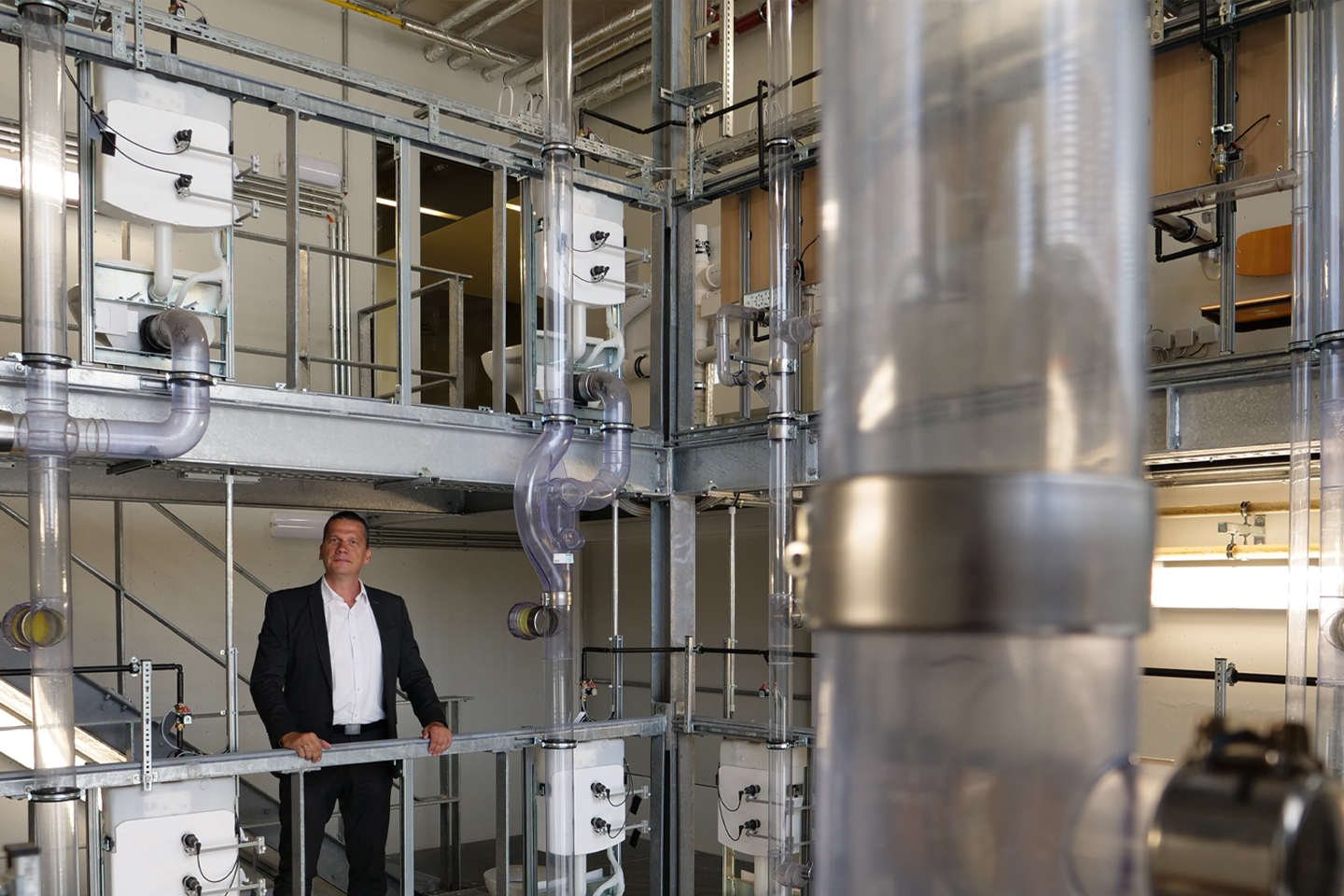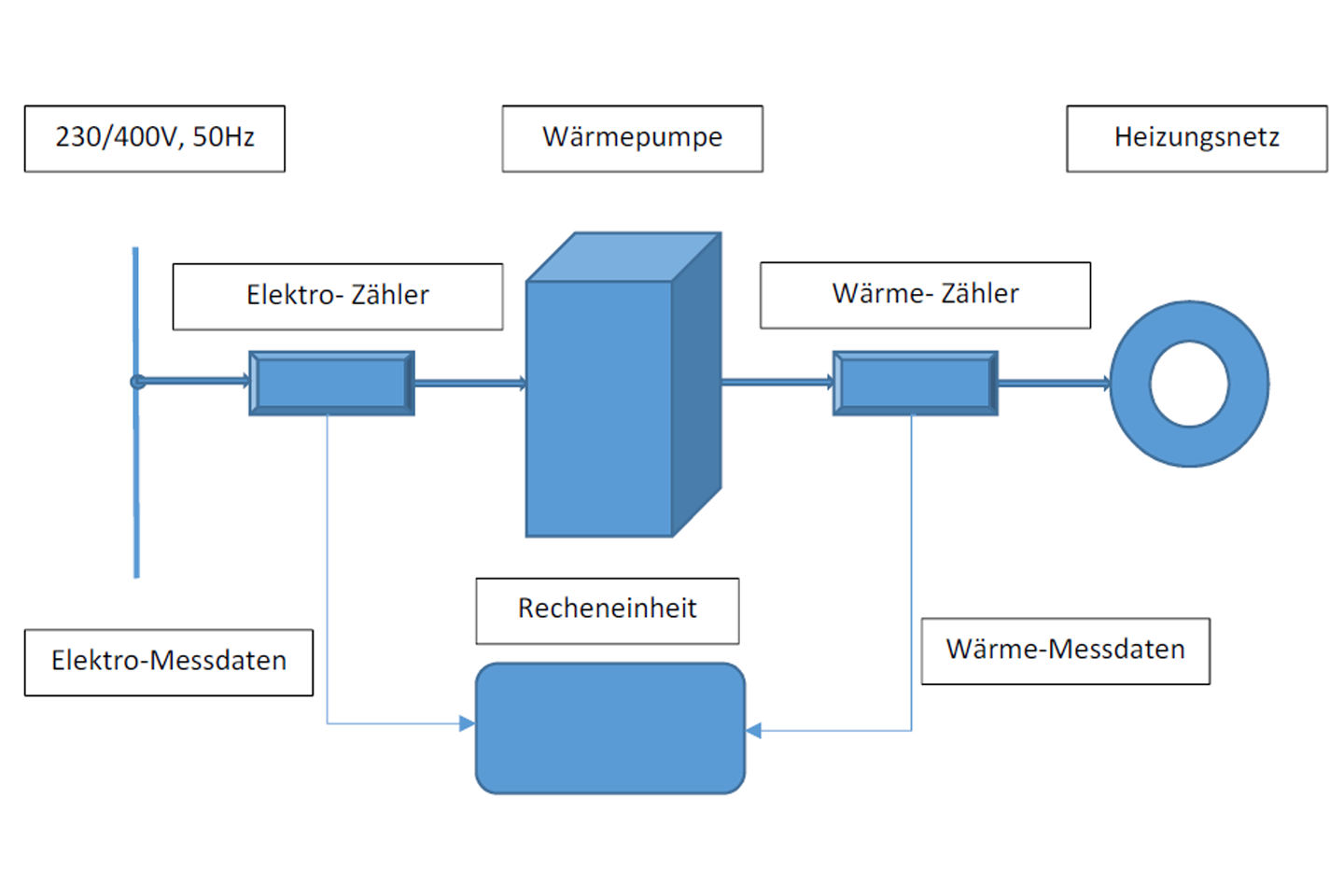The Chair of Building Energy Technology at the Faculty of Engineering will expand the heating technology and drinking water hygiene laboratories with a new research project.
As part of the Energy and Climate funding guideline by the Sächsische Aufbaubank - Förderbank (SAB), financed by funds from the European Regional Development Fund (ERDF) and from tax revenue on the basis of the budget adopted by the Saxon state parliament, the HTWK Leipzig, Faculty of Engineering - Chair of Building Energy Technology received the grant notification on 21 August 2024 for a two-year energy monitoring project in heating and sanitary engineering to increase energy efficiency in the amount of 365,000 euros (gross). This will involve expanding the heating technology and drinking water hygiene laboratories.
The team led by Prof Gero Guzek from the Faculty of Engineering was able to score points for the project idea with the following background and objective:
The idea
The technical building equipment systems, the buildings and the users have each been able to demonstrate significant success in saving energy. For the most part, further potential only lies in the interaction of the aforementioned components. The data available on this is mostly unsatisfactory for visualising and quantifying efficiency potential during operation, especially in heating and sanitary technology with the influence of user behaviour.
The aim
The aim of the project is to use energy monitoring to significantly improve the data situation in the context of energy efficiency technologies using renewable energy technologies and digitalisation in building energy technology and to create added value for students. The Building Energy Act 2024 aims to motivate owners and operators to choose a heat pump to heat their property in the short to medium term. In practice, however, the heat pumps used often do not work with the specified COP values and seasonal performance factors. This can result in high operating costs. Only monitoring can help to detect the optimum operating mode of a heat pump.
The perspective is somewhat different in the case of sanitary technology due to the necessary energy savings in heating technology. The aim here is to maintain the permissible temperatures of the cold drinking water, the hot drinking water and the circulation pipe in accordance with the Drinking Water Ordinance and still save energy.
Rainwater drainage is another area of research:
Rainfall events of the century are becoming more frequent and often lead to flooding and devastating damage. In the building services sector, inadequate rainwater drainage systems or a lack of roof slopes often lead to massive damage, particularly due to unauthorised roof loads and other factors.
The heating and sanitary engineering laboratories (water tower) of the Chair of Building Energy Technology of the Faculty of Engineering at HTWK Leipzig are to be expanded and utilised for the aforementioned investigations. The project is being coordinated by the Chair of Building Energy Technology.
Investigations into the dynamic annual performance factor (dJAZ) of air-to-water heat pumps under practical conditions and different user behaviour are planned. In addition, different system limits are to be defined in order to objectively investigate the efficiency of the heat pump. Specific recommendations for users who wish to install a heat pump will be drawn up.
In the drinking water sector, the "water tower" in the engineering faculty building will be used to simulate issues relating to hydraulic balancing, drinking water hygiene and the effects of "standstill lines", e.g. after individual floors of properties have been vacated. Hot water systems operated at excess temperatures cause high energy consumption. Continuous monitoring can help to reduce this and at the same time comply with the requirements for preventing legionella infestation. The method using disruptive sensors should be integrated with the subsequent installation of a real hot water and circulation system (see publication HLH_Bd. 74 (2023) No. 6 pages 34-36). Recommendations for the construction and operation of domestic hot water systems are to be drawn up from the data obtained.
In order to be able to simulate and analyse heavy rainfall events over a longer period of time, it is necessary to integrate gravity drainage in order to record the direct influence of targeted rainwater drainage and generate recommendations for action (e.g. change in slope, user influences, lack of roof maintenance - blockages, etc.).
With the help of the data obtained from the monitoring, concrete guidelines and recommendations for action for the use of heat pump technology are created. This is only made possible by monitoring to record the dynamic annual performance factor. Possible incorrect actions by the user on the system control are identified, concretised and excluded in future. This will result in lower operating costs. In drinking water hygiene and wastewater technology, the monitoring will also produce recommendations for action and guidelines for the construction and operation of drinking water systems and rainwater drainage systems for all users.
The project increases the scientific and economic performance of the Leipzig University of Applied Sciences. Private and public sources of funding will be tapped and jobs in science will be created and secured. The research results can be used for teaching and internships and serve to improve the quality of teaching as part of the commercialisation strategy. In addition, the project supports the strategy of turning the Building Energy Technology department into a cluster of excellence for training in the use of energy in buildings. Furthermore, the project forms the basis for networking the energy technology laboratories of the Faculty of Engineering Sciences in order to conduct integrated research into energy systems. As a result, the HTWK is becoming more attractive to students and, through the participation of the project partners, is increasing the competitiveness of the economy of small and medium-sized enterprises in the Free State of Saxony in the areas of energy, climate protection and the environment.
Prof Guzek is extremely pleased about the funding and would like to thank the supporters of this project idea, in particular Mr Lippik (FTZ), Prof Jens Schneider, Prof Robert Huhn, Prof Hähle, Dr Radisch, Martin Hafemann, Dagmar Fester and Frank Groksch!

